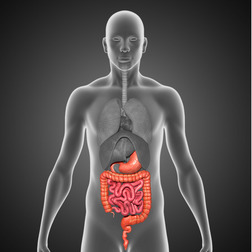In my surgical training at the University of Colorado almost two decades ago, people were beginning to examine why patients involved in trauma were showing physiologic reactions to a molecule known as LPS, or lipopolysaccharide. LPS is a “fatty sugar” found in association with a class of bacteria known as the “gram negatives”. These bacteria are typically some pretty bad actors in the course of human infectious disease, and have intimidating yet eerily musical names: Pseudomonas, E. Coli, Legionella, Klebsiella and Salmonella. What is unique about these bacteria clinically is their destructiveness. The presence of LPS in the bloodstream triggers vascular, immunological, and inflammatory changes that basically wreak havoc within the body, leading to lung, kidney, and cardiac damage, and in many cases death. Once LPS was present in the bloodstream, it became very difficult to save many of these patients as they succumbed to a progressive shut down of all body systems by a spectrum known as “Multiple System Organ Failure.”
We have known for years that the origin of these bacteria is the gut, where they can typically live throughout our lifetime. As with all biological systems, things in our body trend towards a natural balance. It is not uncommon to carry one or more of these organisms in the body for years, but due to competition with several other species of bacteria and a competent immune system, these species tend not to develop an aggressive “foothold”. They cause no symptoms, and do no harm. The interesting fact that compelled the surgeons was that the body showed an inflammatory reaction to the LPS in patients who had not experienced an apparent injury to the bowel. It was as if the stress of the trauma had changed the permeability of the bowel wall, and now substances typically confined to the interior of the gut (in this example LPS) had made it into the general circulation. These patients by definition, weren’t septic, they didn’t have bacteria in their bloodstream, yet a component of the bacterial cell wall had traversed the bowel wall into the circulation and had become the proverbial bull in the china shop. What was it that caused this to happen? Nobody can be entirely sure, but it appears that several factors may come into play that contribute to a change in the integrity of the lining of the bowel. Unquestionably there is a constellation of factors at play, from redistribution of blood flow from the gut, to immunological changes, to the influence of our primary stress hormone cortisol on the bowel. Notice that these are effectively birds of the same feather. The bowel injury has resulted from the stress of the trauma without an apparent disruption of the bowel wall as would be seen with a stabbing or shooting. With trauma, our body produces the identical stress hormones that we generate in our day-to-day lives, but of a different duration and magnitude. Adrenaline shunts blood away from the gut to vital organs such as the heart and brain. Capillaries leading to the gut are constricted, and segments of the intestines can be damaged from a lack of blood flow. Steroid stress hormones, principally Cortisol, have been known to be associated with bowel injury, bleeding and perforation for years. Bowel injury is commonly seen from cortisol’s non-steroidal cousins, the over-the-counter medicines known as Motrin (Ibuprofen) or Aleve (Naprosyn). One thing is for sure. Stress is bad for the gut. Our physiology wasn’t designed to withstand constant, repeated stressors. We needed to run away from the tiger, endure the famine, or engage in a battle with the neighboring tribe, after which we would rest and the stress response could reset. Never in nature was the human body expected to survive the extensive trauma that is managed with modern medical care, much less the daily stresses we foist upon ourselves in today’s hectic, modern world. For years a test has been available to look objectively for damage to the single layer lining, the epithelium, of the gut. Ideally this internal layer of the gut (which if stretched out would approximate the area of a doubles’ tennis court) remains intact with proteins known as tight junctions between the cells. When these junctions become disrupted, substances are able to pass between the cells, circumventing the tightly regulated passage of material through the cells. The premise of this test, known as a Lactulose/Mannitol test, is quite simple. Lactulose is a large sugar, and is normally too large to pass through an intact gut lining. The sugar Mannitol is small, and typically passes with ease. So if a patient drinks a glass of the sugars Lactulose and Mannitol, one would expect passage of the smaller molecule Mannitol, into the bloodstream, but not the larger sugar Lactulose. Quite simply, the test looks for the presence of Lactulose in the urine. If Lactulose is present in the urine, it had to make it in to the blood stream through the lining of the gut. There is no other route. So with the understanding that the human gut can indeed become “leaky”, things start to get really interesting. In 2000, a Harvard gastroenterologist by the name of Alessio Fasano discovered a protein known as zonulin which regulates the tight junctions between the epithelial cells lining the gut. Dr. Fasano’s work not only associated the protein with tight junction defects, but it also demonstrated that zonulin’s signaling and influence is regulated by a protein found in wheat, the notorious gluten molecule. So in genetically predisposed individuals, the presence of gluten actually causes the gut to break down its tight junctions between the cells, allowing for unrestricted contact of substances normally sequestered within the gut, and the underlying tissues. Fasano studied the molecule gluten. The surgeons were focused on the molecule LPS. Both molecules breached the lining of the gut and caused significant clinical damage. Fasano’s lab was able to demonstrate all of the factors leading to the human autoimmune disease Celiac Disease, a disease known from the early 20th century to be associated with gluten. He showed the association of a known genetic predisposition (genetic markers HLA DQ-2 and DQ-8), with the known antigen (gluten), and ultimately the way in which they came in to contact with one another (a leaky gut from altered zonulin signaling, and exposure of the molecule gluten to the immune system). This is pretty exciting stuff, considering that this is the only complete model for an autoimmune disease that explains all of the factors that contribute to the disease: the environmental factor (gluten), the barrier that is broken to activate the immune system (zonulin, leaky gut), and the patient’s genetic predisposition. Humans have over 70 different described autoimmune conditions. Apes, our genetically similar cousins, have none, although we share 99% of the same DNA sequences. However apes have no zonulin in their bodies, a component of the divergent 1%. Could there be a connection? To conclude: Leaky gut exists. And a leaky gut unquestionably influences our health. The good news is that slowly the medical mainstream is beginning to realize that this is happening. The bad news is that mainstream medicine has no understanding of the factors that must be addressed to remove the offending toxin or microbe contributing to the leakage, to repair the gut lining, or to repopulate the gut with the beneficial, immune suppressing bacteria. But a functionally trained doctor does understand these relationships, and in this context can make inroads into gut function, immune function, and overall health. I posit that in the next two decades we will see the function, immunology and microbiology of the gut as a front and center contributor to many chronic diseases, cancers and autoimmunity. But why wait for your family doctor to become aware of the science in another decade, when your immunological horse may have already left the barn? The research, science and interventions exist today. Find a practitioner who understands this, and begin to take your health to a new level by taking care of your gut. Comments are closed.
|
Categories
All
Archives
June 2017
|


 RSS Feed
RSS Feed